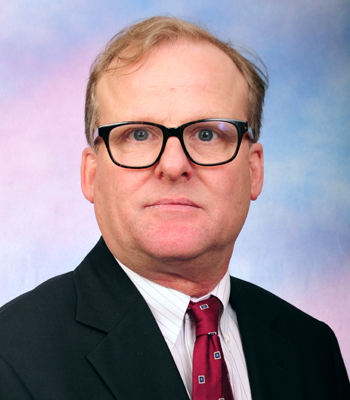George Brush
Position Title
Associate ProfessorBasic Science
Office Location
Karmanos Cancer Institute
Elliman Building, RM - 3122
421 E Canfield
Detroit, MI 48201
Mailing Address
Office Phone
313-578-4300Office Fax
313-832-7294Education Training
Education
(1992) Ph.D,. The Johns Hopkins University, Baltimore, MD
(1981) A.B., Princeton University, Princeton, NJ
Postgraduate Training
(1991-1997) Postdoctoral Fellow with Dr. Thomas J. Kelly: Department of Molecular Biology & Genetics, The Johns Hopkins University School of Medicine, Baltimore, MD
Professional Experience
Faculty Appointments
(2010-Present) Associate Professor, Department of Oncology, Wayne State University School of Medicine ,Detroit, MI
(2006-2012) Associate Professor, Karmanos Cancer Institute and Department of Pathology, Wayne State University School of Medicine, Detroit, MI
(1999-2006) Assistant Professor, Karmanos Cancer Institute and Department of Pathology, Wayne State University School of Medicine, Detroit, MI
(1997-1999) Research Associate, Department of Molecular Biology & Genetics, The Johns Hopkins University School of Medicine, Baltimore, MD
Hospital or Other Professional Appointments
(2015-Present) Director, Basic Medical Science and Medical Research Master of Science Programs, Office of Biomedical Graduate Programs, Wayne State University School of Medicine
(2010-Present) Associate Director and Graduate Officer, Cancer Biology Graduate Program, Department of Oncology, Wayne State University School of Medicine, Detroit, MI
(2011-2012) Scientific Director of Shared Resource Facilities, Karmanos Cancer Institute, Wayne State University, Detroit, MI
Honors and Awards
(2007) College Teaching Award, Wayne State University School of Medicine
(2006-2007) Selected for The Academy Fellowship leadership program, Karmanos Cancer Institute
(2003) College Teaching Award, Wayne State University School of Medicine
(1997) Certificate of Merit, Young Investigators' Day, The Johns Hopkins University School of Medicine
Courses taught
CB 7210: Fundamentals of Cancer Biology
CB 7220: Molecular Biology of Cancer Development
CB 7240: Principles of Cancer Therapy
CB 7300 F31: Special Topics in Cancer Biology - Grant Writing
CB 7700: Recent Development in Cancer Biology
CB 7990: Research Technologies in Cancer Biology
IBS 7015: Molecular Biology
PHC 7410: Principles of Toxicology
Research Interests
Our research focuses on regulatory mechanisms that ensure proper progression through the cell cycle and meiosis. Fundamental processes such as these have been highly conserved through evolution, and we employ the model eukaryote Saccharomyces cerevisiae for its experimental tractability. Through this strategy, we expect to uncover general principles that underlie preservation of genomic integrity. This type of regulation is critical to human health as genomic instability is a hallmark of cancer and errors in DNA transactions during meiosis can lead to debilitating disease. We have placed considerable effort into characterizing Mec1, the yeast orthologue of the human checkpoint protein kinase ATR. In addition, our recent work has centered on the meiotic role of certain cyclin-dependent kinase (CDK) complexes that are known to both promote initiation of DNA replication and preclude improper re-initiation during the cell cycle. This work has uncovered a Mec1-dependent meiotic recombination checkpoint mechanism that prevents initiation of DNA replication. Our recent studies have also included investigation into the early meiotic role of Ime2, a meiosis-specific protein kinase that is thought to be functionally similar to certain G1 cyclin/CDK complexes.
Publications
Brush, G.S., Najor, N.A., Dombkowski, A.A., Cukovic, D., and Sawarynski, K.E. (2012) Yeast IME2 functions early in meiosis upstream of cell cycle-regulated SBF and MBF targets. PLoS One 7: e31575
Brush, G.S. and Najor, N.A. (2009) Keeping a good rep in meiosis: Mind the CDK. Cell Cycle 8: 1299-1300
Sawarynski, K.E., Najor, N.A. Kepsel, A.C., and Brush, G.S. (2009) Sic1-induced DNA re-replication during meiosis. Proc. Natl. Acad. Sci. USA 106: 232-237
Bartrand, A.J., Iyasu, D., Marinco, S.M., and Brush, G.S. (2006) Evidence of meiotic crossover control in Saccharomyces cerevisiae through Mec1-mediated phosphorylation of replication protein A. Genetics 172: 27-39
Clifford, D.M., Stark, K.E., Gardner, K.E., Hoffmann-Benning, S., and Brush, G.S. (2005) Mechanistic insight into the Cdc28-related protein kinase Ime2 through analysis of replication protein A phosphorylation. Cell Cycle 4, 1826-1833
Bartrand, A.J., Iyasu, D., and Brush, G.S. (2004) DNA stimulates Mec1-mediated phosphorylation of replication protein A. J. Biol. Chem. 279: 26762-26767
Clifford, D.M., Marinco, S.M., and Brush, G.S. (2004) The meiosis-specific protein kinase Ime2 directs phosphorylation of replication protein A. J. Biol. Chem. 279: 6163-6170
Brush, G.S., Clifford, D.M., Marinco, S.M., and Bartrand, A.J. (2001) Replication protein A is sequentially phosphorylated during meiosis. Nucleic Acids Res. 29: 4808-4817
Brush, G.S., Morrow, D.M., Hieter, P., and Kelly, T.J. (1996) The ATM homologue MEC1 is required for phosphorylation of replication protein A in yeast. Proc. Natl. Acad. Sci. USA 93: 15075-15080
Brush, G.S., Anderson, C.W., and Kelly, T.J. (1994) The DNA-activated protein kinase is required for the phosphorylation of replication protein A during simian virus 40 DNA replication. Proc. Natl. Acad. Sci. USA 91: 12520-12524
Pubmed Database Link: https://pubmed.ncbi.nlm.nih.gov/?term=george+brush
